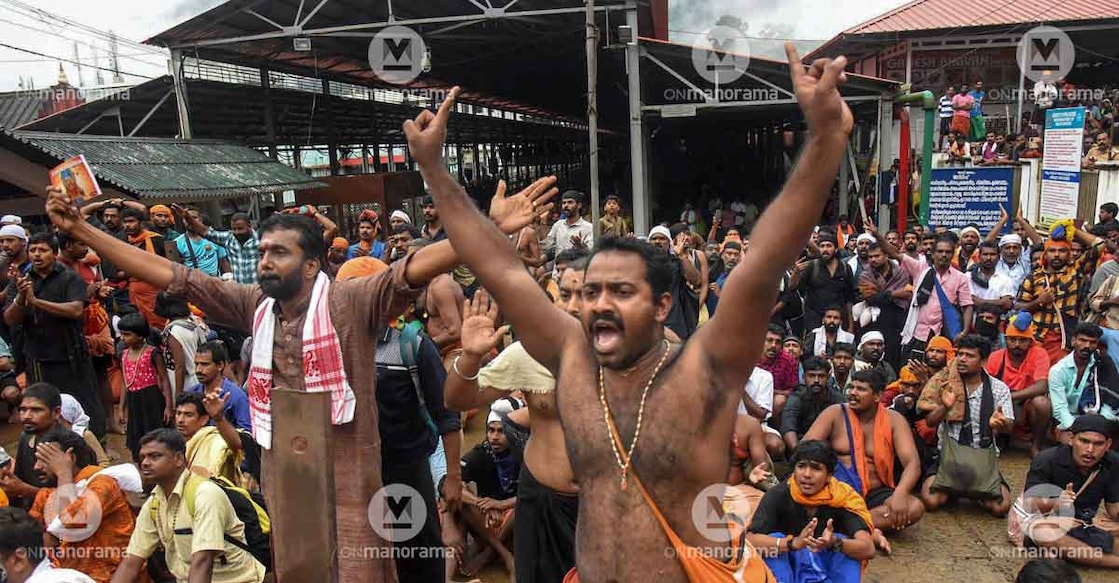Column | RSS's twisted trek to Sabarimala

Mail This Article
Revelations that a yoga guru had facilitated peace talks between the RSS and the CPM in Kerala's Kannur hit the headlines when journalist Dinesh Narayanan's notable book was published. 'RSS and the Deep Nation', published by Penguin, shed light on the inner mechanisms of the talks that put an end to the spiral of political violence in the northern district. The book also recounts another behind-the-show narrative concerning an equally contentious issue – Sabarimala.
Narayanan writes about the about-turn of the RSS when it comes to the Supreme Court order that rejected the custom of barring women of menstruating age atop the popular hill shrine. The book is worthy of a rereading at a time when the BJP is trying to rake up the Sabarimala agitation as a political tool against the Left Democratic Front government.
The RSS was clearly in favour of allowing women into all places of worship. They had taken a principled stand on the issue two years before the Supreme Court passed its controversial order on Sabarimala. A central character of the narrative was Tripti Desai, the activist who unsuccessfully tried to go to Sabarimala amid stiff protests in Kerala.
Desai had earlier launched an agitation to seek women's entry into Maharashtra's Shani Shingnapur temple. The RSS supported the women's movement. Suresh Bhaiyyaji Joshi, who recently quit as RSS general secretary, even called for debates to change the attitude that barred women in the name of customs.
Joshi reiterated the position even after the Sabarimala verdict came out. He said that such a custom could not be favoured in this age and any exemption to any temple was out of the question. Joshi is quoted in 'RSS and the Deep Nation', along with mentions of an article written in RSS Malayalam mouthpiece 'Janmabhoomi' by deputy editor Sanjayan who strongly supported the court order.

The RSS had to rethink its position after the Nair Service Society (NSS) raged against the court order and the Pinarayi Vijayan government's attempts to implement the order, Narayanan concludes in the book. The sign of change came from Joshi himself five days after the court verdict. He said it was natural for women to protest in the street. He said that it was unfortunate that Pinarayi decided to implement the court order without giving a thought to the sentiments of lakhs of devotees.
BJP's then state president, P S Sreedharan Pillai, was caught on camera saying that Sabarimala was "a golden opportunity".
Kerala witnessed street protests but the state government did not backtrack from its decision even after the pilgrimage season started. The government and the ruling alliance launched a counter-campaign to remind the people of Kerala's renaissance values. The political dividends of the campaign are yet to materialise in Kerala, the last remaining island of left influence, the book points out.
Side-tracking RSS
The RSS may have been completely in the dark about the selection of BJP state president Kummanam Rajasekharan as the governor of Mizoram. Narayanan confirms the speculation in his book. Kummanam himself was taken by surprise when a woman congratulated him for his new position during a byelection campaign in Chengannur. He was not aware of the development until she pointed to the television screen where the breaking news was flashed.

Kummanam called up national and state leaders of the RSS but they were equally clueless. The RSS state executive council met the following day and sent a letter to Joshi with a stinging allegation that the BJP tricked the RSS in Kerala. Kummanam said that he was not going to take up the governor's position.
A crisis ensued when the RSS insisted that they had a right to decide on one of their cadre who was deputed to the BJP. The BJP, on the other hand, said they had full rights to decide on the future of their state president.
Prime minister Narendra Modi had to call up Kummanam directly to convince him to take up the position, Narayanan writes. The book that presents a detailed analysis of the way the RSS functions, mentions Kerala in other instances too.


